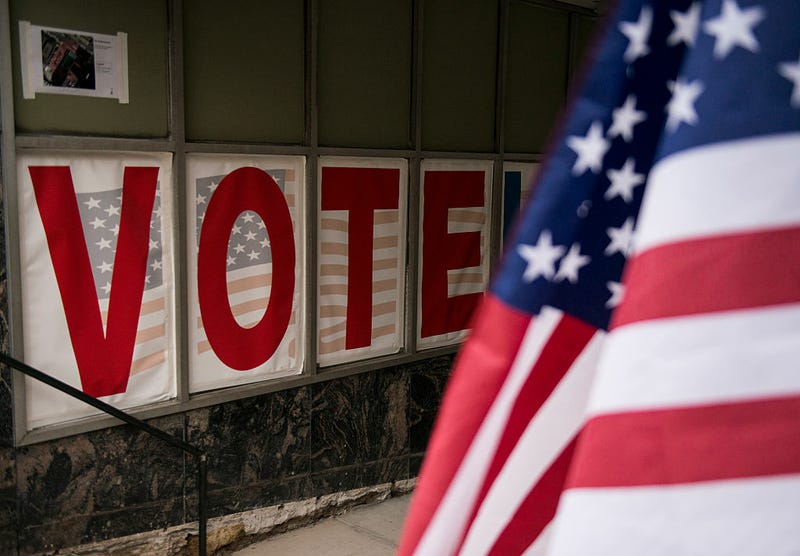New York Got It Right: The Constitutional Case for Citizen-Only Elections
New York’s highest court just struck down New York City’s reckless attempt to allow noncitizens to vote, and in doing so, it reaffirmed a fundamental truth: voting is a sacred right of citizenship, not a participation trophy for anyone who happens to cross a border. The decision was not only legally sound but morally imperative. All states must follow New York’s lead and outlaw noncitizen voting permanently to protect election integrity, the legitimacy of representative government, and the very essence of national sovereignty.
The idea that noncitizens should have a say in a nation’s political direction is an absurdity masquerading as inclusivity. The franchise is not a casual privilege handed out to anyone who pays taxes or resides within city limits; it is the core mechanism by which the people—the citizens—govern themselves. Citizenship is not just a bureaucratic status; it is a covenant, an agreement that binds individuals to the responsibilities and privileges of a nation. To extend voting rights to noncitizens is to sever this connection and dilute the weight of citizenship itself.
New York City’s attempt to enfranchise noncitizens was not only unconstitutional but a direct affront to the principles of self-governance. The New York State Constitution is unequivocal in its requirement that voters be U.S. citizens. The city’s law was not just an overreach—it was a blatant attempt to rewrite the rules of democracy without the consent of the governed. If a local jurisdiction can unilaterally redefine who gets to vote, then what’s stopping it from allowing tourists, temporary visa holders, or even foreign diplomats to cast ballots? This is not an abstract slippery slope argument; it is a recognition of the inherent logic of such a reckless policy.
The dangers of noncitizen voting extend far beyond legal technicalities. It is an open invitation to foreign influence in local and, eventually, national politics. Consider the implications of a policy that allows foreign nationals—who may have allegiance to other governments, who may not share American values, and who may not intend to stay in the country—to influence policies that affect American citizens. The right to vote is inseparable from the duty of allegiance. A citizen swears loyalty to the United States; a noncitizen does not. To allow the latter to participate in elections is to undermine the very concept of democratic accountability.
The ethics of noncitizen voting are equally damning. Proponents argue that noncitizens contribute to society, pay taxes, and should therefore have a voice. But by that logic, should tourists who pay sales tax also vote? What about foreign investors who own property and contribute to local economies? Contribution alone does not equal membership. Citizenship, not mere residence, is the proper criterion for electoral participation. Those who wish to vote should take the naturalization oath, pledge allegiance to the United States, and commit themselves fully to the responsibilities of citizenship. Anything less is an insult to every immigrant who followed the legal process to become a citizen.
Furthermore, noncitizen voting undermines trust in elections at a time when faith in electoral integrity is already fragile. The push to allow noncitizens to vote often comes hand in hand with opposition to voter ID laws and other common-sense election security measures. This is no coincidence. When jurisdictions permit noncitizens to vote, it becomes exponentially harder to ensure that only eligible voters are participating in elections at all levels. Without strict citizenship verification, there is no meaningful safeguard against illegal voting in state and federal elections, no matter what proponents claim.
The consequences of noncitizen voting are already evident in jurisdictions that have experimented with it. San Francisco, which allows noncitizens to vote in school board elections, faced significant pushback when it became clear that the policy did not even require legal residency. Washington, D.C., in its eagerness to flaunt progressive credentials, went even further—allowing illegal immigrants to vote in local elections, completely erasing any pretense of a legal framework. Even more alarming, San Francisco has allowed noncitizens to hold elected office, with noncitizen residents serving on city commissions, directly shaping policies that impact American citizens.
A small but dangerous number of jurisdictions currently allow noncitizens to vote in local elections. These include:
Maryland: Cities such as Takoma Park, Hyattsville, and Greenbelt permit noncitizens, including undocumented immigrants, to vote in local elections.
Vermont: Montpelier and Winooski have extended local voting rights to noncitizens.
California: San Francisco allows noncitizen voting in school board elections.
Illinois: Chicago permits noncitizens to vote in Local School Council elections.
Washington, D.C.: Allows noncitizens, including illegal immigrants, to vote in all local elections.
Historically, America has recognized the sanctity of citizenship in voting. While some states experimented with noncitizen voting in the 19th century, the practice was abandoned as America solidified its identity and governance structure. The reason was simple: democracy is strongest when it is tied to national identity. The right to vote is a foundational pillar of self-rule, and it cannot be extended to those who have not pledged themselves to the nation’s well-being.
New York’s court has delivered a crucial rebuke to an insidious trend, but the fight is far from over. Progressives will continue to push for noncitizen voting, using the same tired arguments of inclusivity and fairness while ignoring the fundamental reality that a nation cannot survive if it allows non-members to dictate its policies. The response must be clear and uncompromising: every state must enact laws explicitly prohibiting noncitizen voting, and Congress should reinforce this principle at the federal level.
To do otherwise is to invite chaos. To do otherwise is to surrender sovereignty. To do otherwise is to betray the citizens whose voices and votes actually matter. New York has taken the right step; now, the rest of the nation must follow suit.
If you don't already please follow @amuse on 𝕏.




New York must show the way on citizen voting rights. All of America should follow. “Amuse is incomparable “ (courtesy of Debra C)